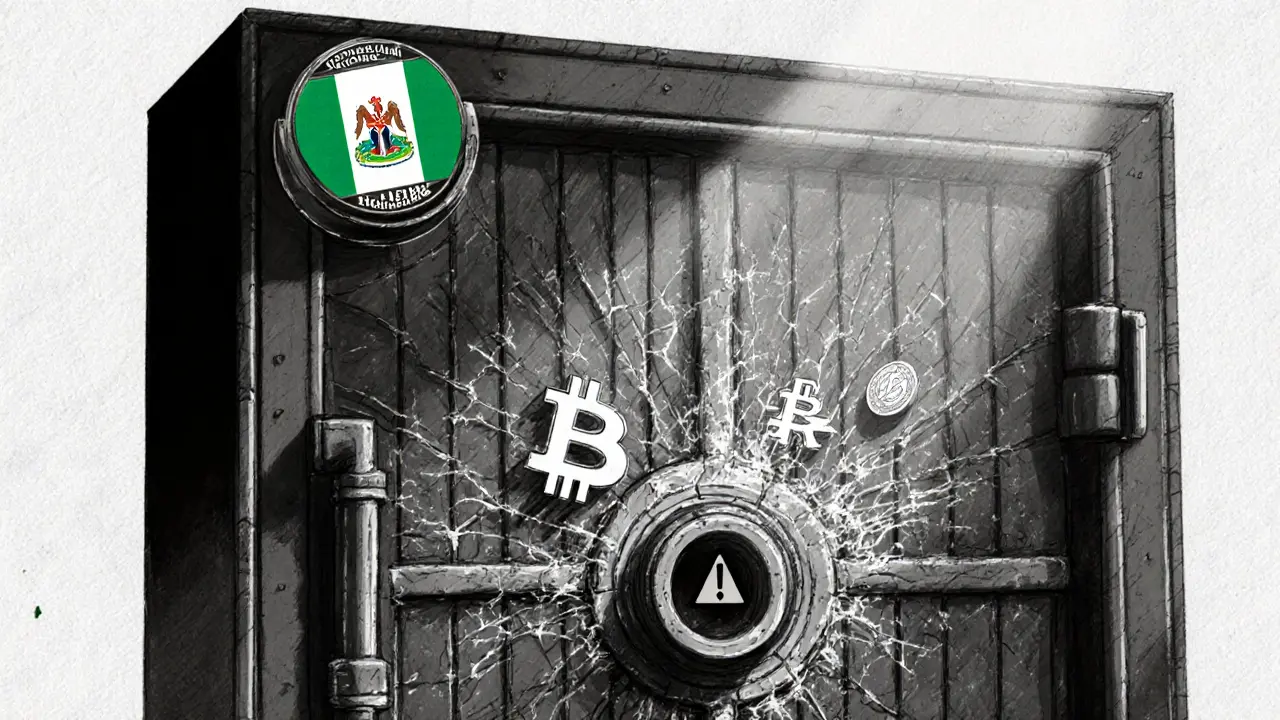Nigeria Crypto Regulation Timeline
About This Timeline
This interactive timeline tracks Nigeria's dramatic shift from a complete crypto ban to a fully regulated digital asset environment. See how each regulatory decision impacted the crypto market.
Key Dates
- 2021 CBN bans crypto transactions
- 2023 Ban officially lifted
- 2025 ISA 2025 gives crypto legal status
February 2021
CBN Imposes Complete Ban
The Central Bank of Nigeria (CBN) issues a circular prohibiting all commercial banks from processing cryptocurrency transactions. This effectively criminalized bank-mediated crypto trade.
Late 2022
Softening the Stance
The CBN begins quietly allowing limited bank-crypto interactions. Simultaneously, the Securities and Exchange Commission (SEC) starts drafting VASP licensing guidelines.
December 2023
Official Ban Reversal
The CBN lifts the 2021 ban, permitting banks to serve licensed crypto firms under strict conditions: transaction limits (20% of average monthly balance), no cash withdrawals, and ongoing monitoring.
2024
Growing Pains
Enforcement actions targeting unlicensed crypto activity increase. The government debates labeling crypto as a national security threat, while FATF Gray List pressure intensifies AML/KYC compliance.
2025
Legal Recognition with ISA 2025
The Investments and Securities Act (ISA 2025) grants digital assets full legal recognition, classifying them as securities under SEC oversight. Banks continue to operate under CBN regulations.
Impact Summary
- 2021 Ban → Shifted to P2P platforms; Nigeria became #2 global P2P volume
- 2023 Reversal → First licensed exchanges launched; market liquidity improved
- 2025 ISA → Regulated growth; foreign investment interest renewed
Current Status: Nigeria now operates a dual-regulatory model with the CBN overseeing banking relationships and the SEC managing securities aspects.
In just four years Nigeria went from blocking banks from touching crypto to creating a full‑blown legal framework for digital assets. If you’ve been watching the headlines, you know the story is dramatic, but you might still wonder how the shift unfolded, what the new rules actually mean, and whether the change will stick. This article walks you through every major milestone from the February 2021 ban to the Investments and Securities Act of 2025, explains the agencies involved, and shows what the future could look like for traders, exchanges, and the wider economy.
Key Takeaways
- The Central Bank of Nigeria (CBN) imposed a sweeping banking ban on cryptocurrencies in February2021.
- By late2022 the CBN began quietly allowing limited bank‑crypto interactions, setting the stage for a formal reversal.
- December2023 marked the official lift of the ban, with banks permitted to serve licensed crypto firms under strict limits.
- The Investments and Securities Act2025 gave digital assets full legal recognition and placed licensing authority with the Securities and Exchange Commission (SEC).
- Adoption kept climbing throughout the ban, making Nigeria the world’s second‑largest peer‑to‑peer crypto market by 2022.
2021: The Ban that Shook the Sector
Nigeria is Africa’s most populous economy, home to over 200million people. Its rapid urbanisation and mobile‑first culture have made it a hotbed for digital finance. The first major regulatory shock came when the Central Bank of Nigeria (CBN) issued a circular on 5February2021 that barred all commercial banks from processing cryptocurrency transactions. Governor Godwin Emefiele warned that “opaque activities” threatened the safety of the financial system, effectively criminalising any bank‑mediated crypto trade.
Even before the 2021 decree, the CBN had already warned against Bitcoin in a 17January2017 directive, but the 2021 order was the first to target the broader ecosystem, including altcoins, stablecoins, and token projects.
The ban forced exchanges to migrate users to peer‑to‑peer (P2P) platforms. By the end of 2022, Nigeria ranked second globally for P2P trading volume, handling more than $1billion per month despite the official prohibition.
2022‑2023: Softening the Hard Line
Pressure kept building. While the ban remained on paper, the CBN began a quiet experiment in late2022, allowing selected banks to engage with crypto firms under undisclosed conditions. The move signalled that the regulator recognised the economic upside of digital assets, especially as the country grappled with foreign‑exchange shortages.
At the same time, the Securities and Exchange Commission (SEC) started drafting a licensing framework for Virtual Asset Service Provider (VASP) entities. The draft guidelines set out KYC/AML standards, capital requirements, and reporting obligations, laying the groundwork for a more formal relationship between banks and crypto firms.
December2023: The Official Reversal
In December2023 the new CBN governor announced the formal lifting of the 2021 ban. Banks were now allowed to open accounts for licensed crypto firms, but only for those holding a valid SEC licence. The reversal came with three concrete conditions:
- Transaction limits: banks must cap crypto‑related transfers at a “prudent” amount, which the CBN later defined as no more than 20% of a client’s average monthly balance.
- No cash withdrawals: crypto accounts could not be used to pull physical cash, limiting potential money‑laundering pathways.
- Ongoing monitoring: banks must flag suspicious crypto activity and report it to the CBN’s Financial Crime Unit.
Alongside the reversal, the CBN released a set of Virtual Asset Service Provider Guidelines that detailed licensing steps, compliance timelines, and enforcement penalties.
2024: Growing Pains and Enforcement Risks
Despite the relaxed stance, 2024 proved a turbulent year. The government continued to blame crypto trading for foreign‑exchange volatility, and a high‑profile case involving Binance saw two senior executives detained on allegations of facilitating illicit fund flows. The incident highlighted that while banks could now work with crypto firms, the enforcement arm of the CBN and other security agencies still had a hard‑line approach toward unlicensed activity.
In May2024, the National Security Advisor floated the idea of declaring crypto trading a “national security threat,” a move that would have re‑tightened restrictions on P2P platforms. The proposal sparked a nationwide debate, but no legislation followed, leaving the sector in a state of regulatory limbo.
On the AML front, Nigeria’s desire to exit the Financial Action Task Force (FATF)Gray List by 2025 added urgency. The International Monetary Fund warned that staying on the Gray List cuts off millions in development financing, so the CBN and SEC doubled down on KYC/AML enforcement for VASPs.
2025: The Investments and Securities Act (ISA) Gives Crypto Full Legal Status
The turning point arrived with the passage of the Investments and Securities Act 2025 (ISA2025).
Key provisions of ISA2025 include:
- Digital assets are officially classified as securities, bringing them under SEC oversight.
- All VASPs must obtain a licence from the SEC and adhere to the new Digital Assets Rules.
- SEC gains authority to levy penalties, conduct audits, and require regular reporting from crypto firms.
- Bank‑crypto relationships remain governed by the CBN, preserving the dual‑regulatory model introduced in 2023.
With ISA2025, owning crypto is no longer a gray‑area activity; it is a regulated financial product. The law also clarifies tax obligations, mandating that capital gains from crypto trades be reported alongside other investment income.
Industry Response: Opportunities and Caution
Major players moved quickly. Yellow Card, the Africa‑focused exchange, announced plans to apply for a VASP licence and partnered with Coinbase to expand into 20 African markets, citing Nigeria’s new framework as a “gateway”.
However, insiders warn that licensing may become a bottleneck. An anonymous crypto CEO told Semafor Africa that “there aren’t going to be as many exchanges as I don’t think they’ll be giving so many licenses out.” The SEC has not published a definitive timeline for licence issuance, creating uncertainty for startups.
Despite the caution, adoption metrics remain strong. A 2023 ConsenSys survey found that 50% of Nigerians want regulations that both encourage participation and protect investors-exactly the balance the new framework aims to strike.
Regional Implications: Africa’s Crypto Wave
Nigeria’s policy swing mirrors a broader trend across Sub‑Saharan Africa. South Africa and Kenya have also moved from tentative bans to structured licensing, positioning the continent as a leader in emerging‑market digital‑asset regulation.
The success-or failure-of ISA2025 will likely influence neighboring nations. If Nigeria can demonstrate that a dual‑regulatory model (SEC for securities, CBN for banking) works, other countries may adopt similar structures, accelerating the continent’s overall crypto ecosystem.

Timeline Comparison
| Year | Regulatory Action | Main Requirements | Market Reaction |
|---|---|---|---|
| 2021 | CBN banking ban on all crypto transactions | Banks prohibited from processing crypto; penalties for non‑compliance | Shift to P2P platforms; Nigeria becomes #2 global P2P volume |
| 2022‑2023 | Soft‑policy pilot; SEC drafts VASP licensing framework | Limited bank‑crypto interactions under undisclosed terms | Gradual confidence boost; exchanges begin licensing prep |
| Dec2023 | Official ban reversal; VASP Guidelines released | Banks can serve SEC‑licensed firms; transaction caps; no cash withdrawals | First licensed exchanges launch; market liquidity improves |
| 2024 | Enforcement actions (Binance arrests); FATF Gray List pressure | Enhanced AML/KYC for VASPs; potential security‑threat label debated | Volatility spikes; investor caution rises |
| 2025 | ISA2025 passes; crypto classified as securities | SEC licensing mandatory; dual oversight with CBN; tax reporting required | Regulated growth; foreign investment interest renews |
Practical Checklist for Crypto Players in Nigeria
- Confirm SEC VASP licence status before opening a bank account.
- Ensure your bank accepts crypto‑related transfers within the 20% limit.
- Implement robust KYC/AML procedures to satisfy both CBN and SEC audits.
- Report all crypto capital gains in your annual tax filing as required by ISA2025.
- Monitor SEC and CBN bulletins for any adjustments to transaction caps or reporting thresholds.
Looking Ahead
With the regulatory scaffolding now in place, the next few years will test Nigeria’s ability to balance innovation with stability. If the SEC can process licences efficiently and the CBN maintains sensible transaction limits, the country could become a magnet for crypto‑focused fintech investment. Conversely, if enforcement remains unpredictable or licensing bottlenecks persist, users may revert to informal channels, undermining the very goals of the new framework. Either way, the 2021‑2025 journey offers a live case study of how emerging markets can pivot from outright prohibition to a nuanced, dual‑regulated ecosystem.
Frequently Asked Questions
What exactly did the 2021 CBN ban prohibit?
The ban barred any commercial bank or financial institution in Nigeria from facilitating the purchase, sale, transfer, or custody of cryptocurrency. Violations attracted fines and possible loss of banking licences.
Can I now keep crypto on a bank account?
Only if the bank is dealing with a SEC‑licensed VASP and the transaction stays within the CBN‑set limits. Direct cash withdrawals from a crypto‑linked account remain prohibited.
Do I need a VASP licence to trade crypto as an individual?
No. Individual users only need to comply with KYC on the exchange they use. The licence is required for platforms that offer wallet, exchange, or custodial services.
How does ISA2025 affect taxes on crypto gains?
Crypto profits are now treated like any other securities gain. They must be reported on annual tax returns, and a 10% withholding tax applies to non‑resident exchanges.
Will Nigeria’s exit from the FATF Gray List depend on crypto regulation?
Effective AML/KYC enforcement for VASPs is a key criterion for FATF compliance. The dual oversight by CBN and SEC is designed to meet that requirement, so a successful exit is closely tied to how well the new rules are implemented.

